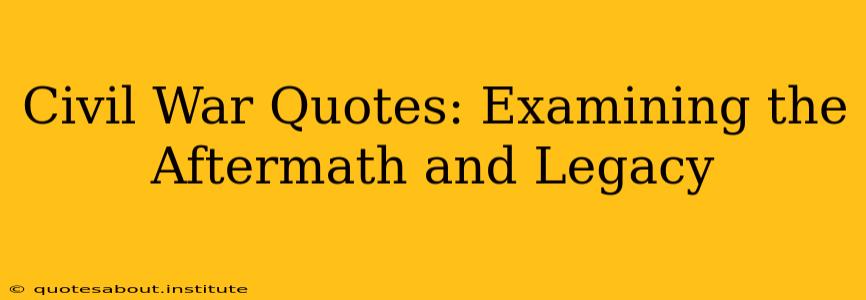The American Civil War, a conflict that tore the nation apart from 1861 to 1865, left an indelible mark on the American psyche and continues to resonate today. Beyond the battlefield's brutality, the war's legacy is woven into the fabric of American identity, shaping its political landscape, social structures, and cultural narratives. Examining quotes from key figures of the time provides a powerful lens through which to understand the immediate aftermath and the enduring impact of this defining period in American history. These quotes, often reflecting the complexities of the era, offer glimpses into the hopes, fears, and struggles of a nation grappling with its own fractured soul.
What were the main causes of the Civil War?
The Civil War wasn't sparked by a single event but rather a complex interplay of factors. The most significant was the issue of slavery, a moral and economic institution that deeply divided the North and South. Differing views on states' rights versus federal authority further fueled the conflict. Economic disparities between the industrialized North and the agrarian South exacerbated existing tensions, creating a volatile atmosphere ripe for conflict. While abolitionists championed the end of slavery, Southern states fiercely defended their "peculiar institution," viewing it as essential to their way of life and economic prosperity. This fundamental clash of values ultimately led to secession and the outbreak of war.
What were some of the major turning points of the Civil War?
Several pivotal moments dramatically shifted the trajectory of the Civil War. The Battle of Gettysburg (1863) is often considered a turning point in the Eastern Theater, marking the high-water mark of the Confederacy's invasion of the North. The Battle of Vicksburg (1863), securing control of the Mississippi River, effectively split the Confederacy in two. These victories, coupled with the Emancipation Proclamation (1863), which shifted the war's focus from preserving the Union to abolishing slavery, significantly altered the war's course and momentum. The surrender of Confederate General Robert E. Lee at Appomattox Court House in 1865 officially ended the conflict, bringing about a period of reconstruction and national healing, though the process was long and arduous.
What was Reconstruction like after the Civil War?
Reconstruction, the period following the Civil War (1865-1877), aimed to rebuild the South and integrate formerly enslaved people into American society. This era witnessed significant legislative efforts, including the 13th, 14th, and 15th Amendments, abolishing slavery, granting citizenship, and guaranteeing voting rights to African American men. However, Reconstruction faced immense challenges, including resistance from white Southerners, who employed tactics like Black Codes and violence to suppress the rights of African Americans. The period was marked by political instability, economic hardship, and ongoing racial tensions. Despite its ultimate shortcomings, Reconstruction laid the groundwork for future progress in civil rights and equality.
How did the Civil War impact the American economy?
The Civil War profoundly reshaped the American economy. The war effort spurred industrial growth in the North, as factories geared up to produce weapons, uniforms, and supplies. The South, however, experienced widespread devastation, with its infrastructure destroyed and its agricultural system disrupted. The abolition of slavery, while morally significant, had profound economic consequences, forcing a reimagining of Southern labor practices and agriculture. The war also led to increased federal power and involvement in the economy, paving the way for the rise of industrial capitalism in the post-war era.
What are some famous quotes from the Civil War era?
Many powerful quotes encapsulate the spirit and struggles of the Civil War era. Abraham Lincoln's Gettysburg Address, with its timeless message of equality and national unity, stands as one of the most iconic speeches in American history. Frederick Douglass's eloquent pronouncements on freedom and equality gave voice to the aspirations of enslaved people and their allies. Quotes from Confederate leaders, though often controversial, provide crucial insights into the perspectives and motivations of the South. These quotes, taken together, offer a multifaceted portrait of a nation grappling with its deepest contradictions. Studying them helps us to understand not just the historical events but also the enduring ethical questions they raise.
Conclusion: A Nation Forged in Fire
The Civil War's legacy continues to shape American society. By examining primary source material, including these impactful quotes, we gain a deeper understanding of the complexities of this critical period in American history and its far-reaching consequences. The struggle for equality and national unity, central themes of the era, continue to resonate today, reminding us of the ongoing need for reconciliation, justice, and a constant striving towards a more perfect union.

